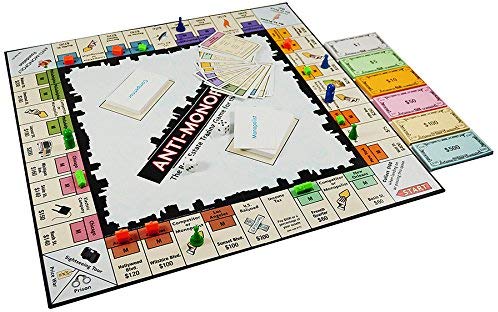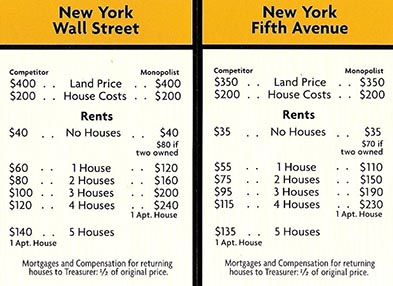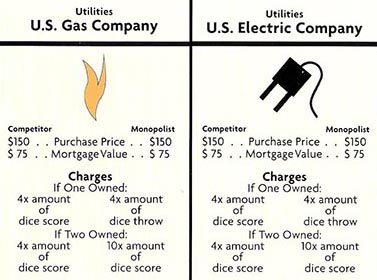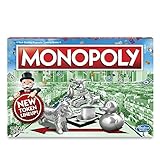
Components

- 3 Wooden blue monopolist pawns
- 3 Wooden green competitor pawns
- 25 Competitor cards
- 25 Monopolist cards
- 28 Title cards/mortgage notes
- Money
- Dice
- 35 Wooden houses
- 15 Wooden apartments
- Rulebook
Object of the Game
Players have a choice of two ways of playing and winning the game:
Game A: To win by bankrupting all other players.
Game B: To be the richest competitor after all monopolists have been bankrupted or to be the richest monopolist after all competitors have been eliminated

Treasurer
Select one player as Treasurer to manage and distribute the money, title cards, houses and apartments. The Treasurer must keep his/her own money strictly separate from the Treasury money.
Competitor and Monopolist Cards
The Treasurer shuffles the Monopolist and Competitor cards and places them face down on the appropriate spaces on the board.
Role Division
-
The players are divided evenly to be either competitors or monopolists.
-
Even division means that there are the same number of competitors and monopolists or, if there is an uneven number of players, the difference between competitors and monopolists cannot be more than one.
(For example, a division of 2 competitors and 3 monopolists is legitimate but division of 2 competitors and 4 monopolists is against the rules).
-
Role division is done by rolling the dice and letting the player with the highest dice score choose between being either a monopolist or competitor and then letting the others make their choices by clockwise rotation. Players may trade off roles before the start of the game if they wish.
-
The initial role assignment cannot be changed during the game.
Starting Budget
The Treasurer gives each player $1,500; two $500, three $100, two $50, seven $10, five $5 and five $1. (Caution: The money is just right to keep the game balanced. It is less that you may remember from other games - so watch your money!)

Order of Play
The same dice outcome used from Role Division is also used to determine the rotation of players and to choose the color of playing tokens. Competitors must choose a green pawn; monopolist must choose a blue pawn.
Doubles Give One Extra Turn
Players throwing doubles move their token as usual - but must then take one extra turn. On this extra turn, doubles are treated as an ordinary throw and do not bring about yet another turn.
Movement
All players place their tokens on Start. Players then move their tokens around the board by rolling the dice and moving them clockwise around the board according to the number of spaces indicated by the dice outcome.
Players also move their tokens according to other directions in the game.
Property Purchases and Payments
Players who land on a street, transportation company or utility not owned by anyone my buy this property at the price marked on the board or title card. If a player declines to buy the property, it stays in the Treasury as un-owned property.
The Treasurer gives the purchaser the appropriate title card.
A player landing on a street, transportation company or utility owned by someone else must pay the owner the amount listed on the respective title card.

Monopolizing a City
When monopolists own any two streets in a city, they have monopolized the city. Then they can charge double rent on the streets owned.
When the city has three streets, monopolists can charge double on that street also when acquired. Monopolists may build only in cities they have monopolized.
Building House and Apartments
-
Competitors can build up to four houses on each street they own. Instead of building a fifth house, competitors return the four houses to the Treasury and purchase an apartment. Prices for the improvements are listed on the title cards.
Competitors place their houses on the space on which the city name is printed.
-
Monopolists can build up to three houses on each city street they have monopolized. Instead of the fourth house, monopolists return the houses to the Treasury and purchase an apartment.
Prices for the improvements are listed on the title cards. Monopolists place their houses on the space marked with an M.
-
Houses and apartments may be purchased only on the player's turn.
-
There are no restrictions on how players may distribute their houses on the properties on which they may build. For example, they may put one house on one property in a city and an apartment on another property in the same city.
However, once built, a house may not be shifted around on properties.
Mortgages
-
Mortgage values are one-half of the purchase price listed on each title card. Players cannot collect rent on any mortgaged property and they cannot have houses on mortgaged property.
Monopolists cannot have houses in a city if any one of the two properties needed for monopolization of a city are mortgaged. Monopolists can collect a single rent on any unmortgaged property in such a city but not double rent.
-
When players mortgage a property, they turn over to the Treasurer the appropriate title deed. The Treasurer keeps the mortgaged properties apart from unsold property title cards.
-
Houses must be returned to the Treasurer for the usual return price (see Rule 13) before the property on which they are located can be mortgaged.
-
Mortgaged streets, transportation companies and utilities may be sold to other players as mortgaged properties at any agreed price.
-
If the players want to get their mortgaged property back into play, they may pay to the Treasurer the amount listed on the mortgage note (shown on the back of the title card). The Treasurer then returns the appropriate title card to the player.
Returning Houses to the Treasurer
The compensation is one-half the purchase price. Houses may be sold by players only to the Treasurer.
Landing on other Spaces
Start Space
Players collect $100 when landing on or passing START.

Price, Price War or Sight-seeing Space
Players can end up on this space in two different ways:
-
They land there during a regular move. Then they are just sightseeing. They move on when their next turn comes and they pay no penalties to leave.
-
They are sent there by landing on the go to prison or go to price war space or by following directions on the Competitor or Monopolist cards.
In this case, they have to move their token to either the prison or price war triangle without collecting anything from the start space. They may have to pay a penalty to move on.
Competitors are sent to price war. While on price war, competitors continue to collect rents or other charges due them.
Monopolists are sent to prison. While in prison, monopolists do not collect rents or other charges normally due them.
Players leave prison or price war in one of two ways:
-
They throw doubles on any one of their first two regular turns after landing there. If no doubles are thrown on these two turns, they must pay $50 before their third turn. On their third turn they move forward as usual.
-
They pay $50 before the first or second turn and then move forward as usual.
Doubles thrown while on the PRISON or PRICE WAR space is treated exactly like any other doubles.
Competitor or Monopolists Spaces

Competitors pick the top card of the Competitor deck and follow directions. Monopolists pick the top card of the Monopolists deck and follow directions. The card is then returned to the bottom of the deck in both cases.
Income Tax Space
Pay $200 or a percentage of your assets (assets are money, houses and apartments, and unmortgaged properties).
Monopolists pay $200 or 20 percent of their cash plus 10 percent of the listed purchase price of their unmortgaged streets, transportation companies or utilities and 10 percent of the original cost of their houses and apartments.
Competitors pay $200 or 10 percent of their cash plus 10 percent of the listed purchase price of their unmortgaged streets, transportation companies or utilities and 10 percent of original cost of their houses and apartments.
Property Tax
Everybody pays $75.
Transportation Companies

Transportation companies owned by competitors earn the usual 10 percent return no matter how many are owned. This is because they are subject to utility regulations.
The fares of transportation companies owned by monopolists double with each additional company acquired by a monopolist. (Caution: A monopolist who owns all four transport companies will be hard to beat in this game.
In the real world, can you imagine what would happen if a monopolists controlled all transport - without utility regulation?)
Utilities

When a player lands on a utility owned by someone else, he/she throws the dice and pays as follows:
Competitors collect 4X the amount of the dice throw no matter how many utilities are owned.
Monopolists collect 4X the amount of the dice throw if one utility is owned; 10X if both are owned.
Anti-monopoly Foundation

Competitors roll one die. If 1, collect $25, if 2, collect $50. Otherwise, no grant, no collection.
Monopolists pay $10 into the Foundation. Payment is made to the Treasurer.
Insufficient Houses
If the Treasurer runs out of houses or apartments, players must make up extra ones out of cardboard or paper as needed.
Trading
Trading between players is allowed except for houses and apartments. These must be returned to the Treasurer (Rule 13) before properties are traded.
Bankruptcy
Bankrupted players must first resell their houses and apartments back to the Treasurer at half price. Then, the bankrupt players' remaining money and property (with mortgages still in effect) are turned over to the player who caused bankruptcy, and the bankrupted player leaves the game.
If players are bankrupted by the Treasurer, all their cash and property is turned over to the Treasurer. The property becomes unsold, unmortgaged property to be resold as usual to the remaining players.
Who is the Richest Player
The richest player and winner of Games B is determined by adding up the players' cash plus income that can be earned on unmortgaged properties when one player lands on them. For income on utilities, each utility owner throws the dice as like with Utilities.
Borrowing From Other Players
Players may not borrow from other players.
Two Hour Game
(This game is also recommended for tournaments)
The winner and richest player is chosen by the following procedure:
-
Players can adjust their holdings as they think best by buying or selling houses or mortgaging or paying off mortgages on their holdings. The player may only deal with the Treasurer and they may not trade or sell property or pay money among themselves.
-
Competitors are allowed to keep 10% of their remaining cash while monopolists are allowed to keep 20% of their remaining cash. The remainder is turned over to the Treasurer.
-
The Treasurer travels around the board once, stopping on each piece of owned property once. He or she then pays from the bank to the owner of each property the rent or payment due according to the usual rules.
-
The winner is the player with the most cash.
Other Monopoly Editions
- Monopoly City
- Monopoly Cheaters Edition
- Monopoly Deadpool
- Monopoly Deal
- Monopoly Fortnite
- Monopoly for Millennials
- Monopoly Frozen II
- Monopoly Game of Thrones
- Monopoly Friends
- Monopoly Gamer
- Monopoly Junior
- Monopoly Junior Electronic Banking
- Monopoly Junior Party
- Ms. Monopoly
- Monopoly Marvel Avengers
- Monopoly - Longest Game Ever
- Monopoly Original
- Monopoly Peppa Pig
- Monopoly Socialism
- Monopoly Stranger Things
- Monopoly - The Mega Edition
- Monopoly The Simpsons
- Monopoly Speed
- Monopoly Revolution
- Monopoly Star Wars
- Monopoly Toy Story
- Monopoly Ultimate Banking
- Monopoly Voice Banking
Continue Reading


